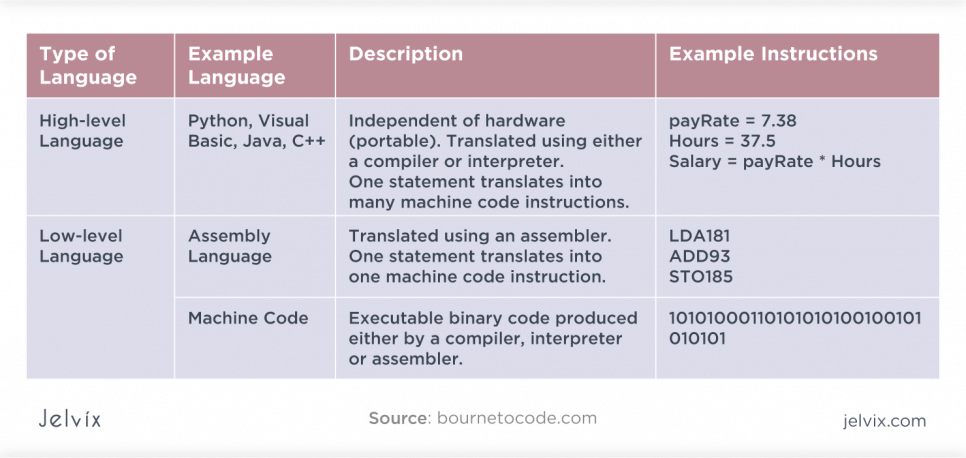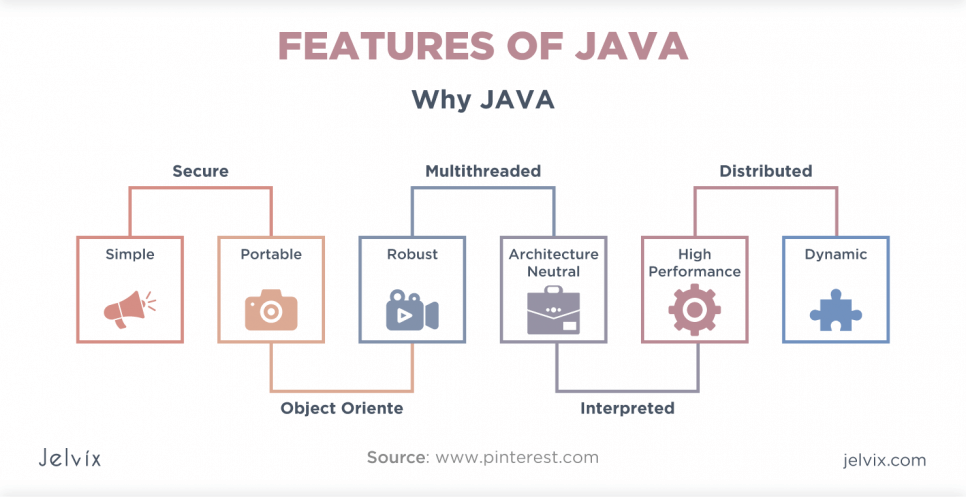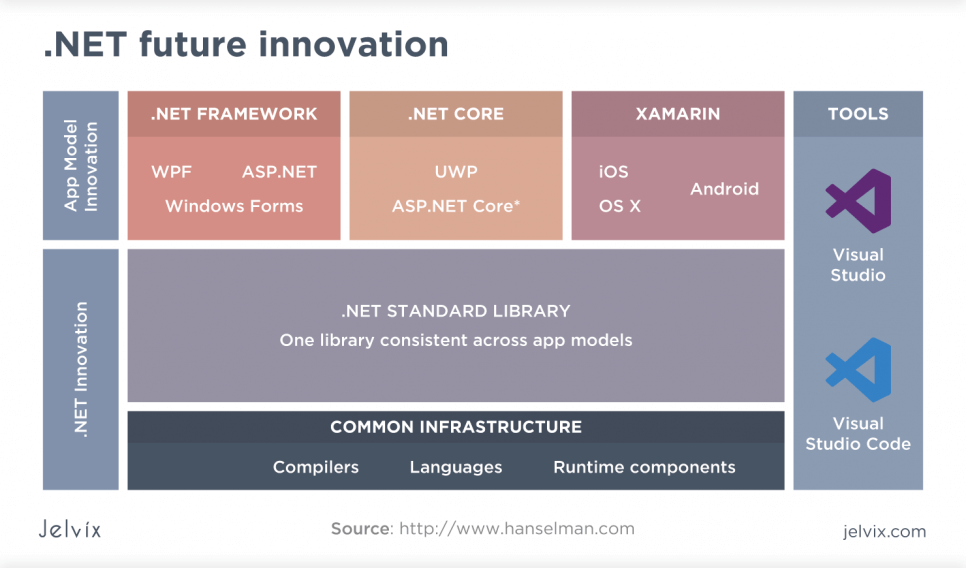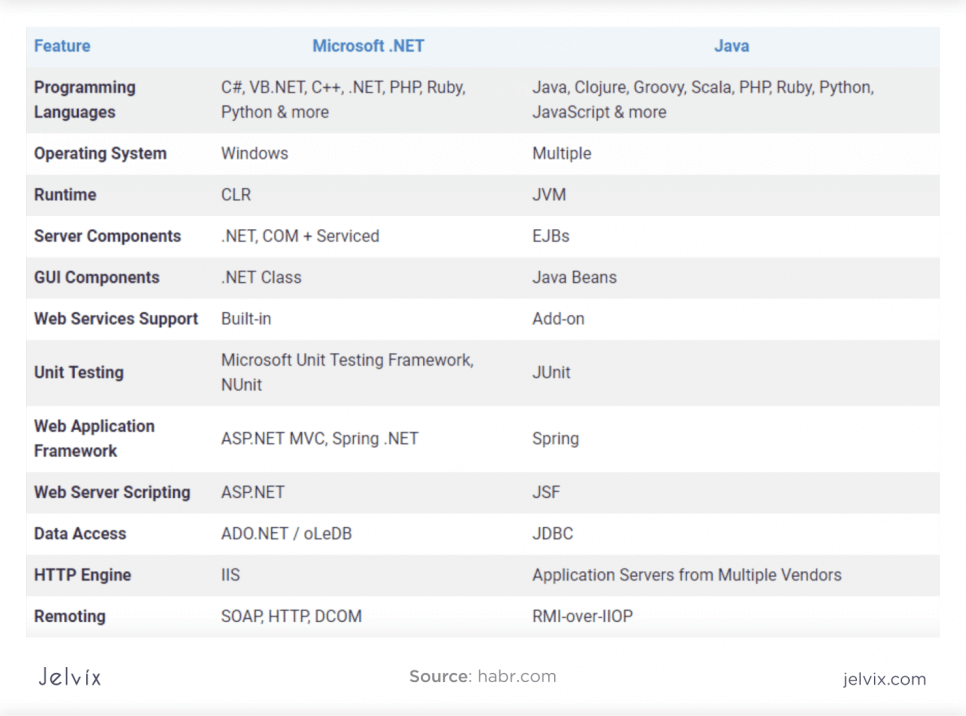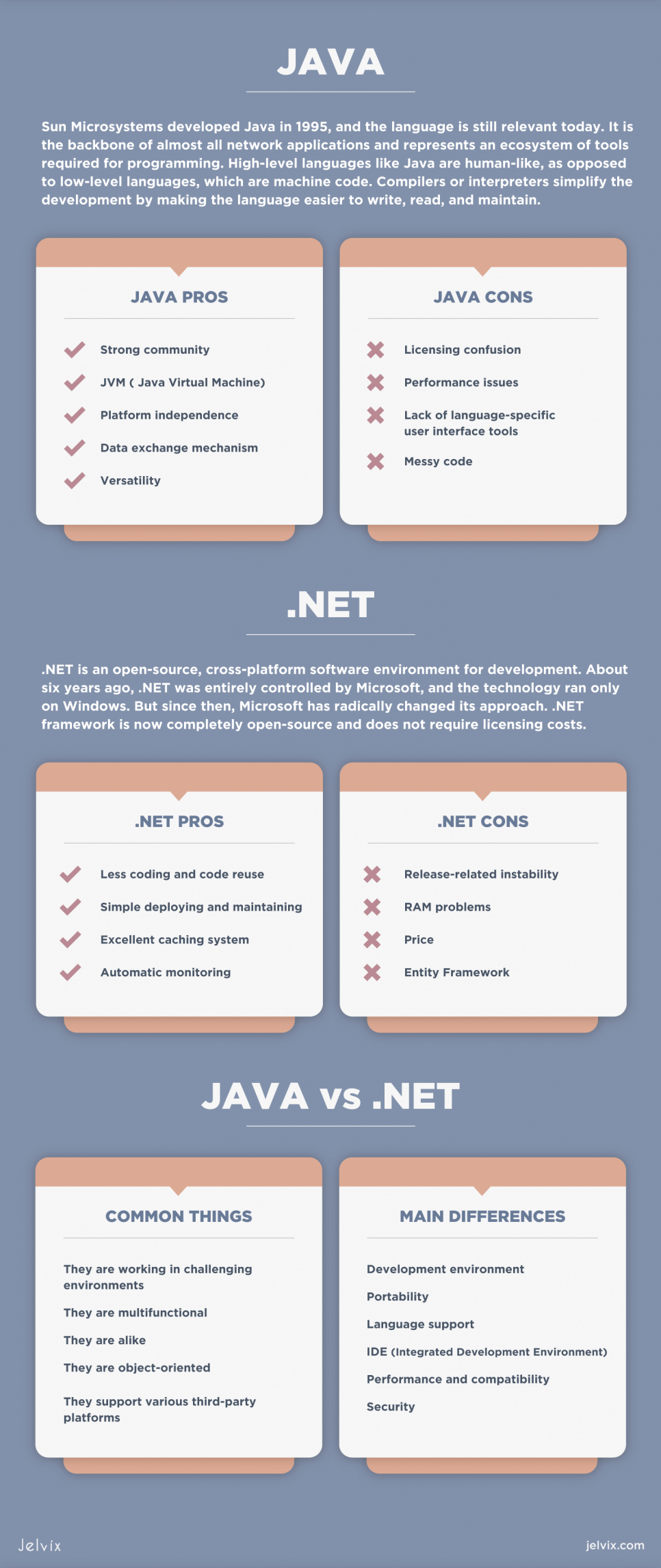Times change, as do technologies, and the priority and importance of technical languages change along with them. Therefore, when you have to choose between them, there are many factors to consider.
Sometimes it makes sense to take a fresh look, even at a standard technology, and assess its prospects. Entrepreneurs and developers often face the problem of choosing between two or more technologies, be it a technology stack for a new project or a new language for learning.
This article will compare Java and .NET. Why precisely these two technologies? Because they are considered the preferred options for developing complex and large-scale enterprise applications. It is pretty standard for Java developers to switch to .NET and vice versa.
If you are familiar with these two technologies, you might wonder how we can compare them in general? After all, Java is a programming language, and .NET is a framework that can use over 40 languages.
However, one language used with .NET, namely C#, is considered a direct competitor to Java. Therefore, the choice between Java vs. C# can be difficult for customers and developers. But we will try to make it clear. We will consider Java and .NET separately and then compare them with each other.
Introduction to Java
Sun Microsystems developed Java in 1995, and the language is still relevant today. It is the backbone of almost all network applications and represents an ecosystem of tools required for programming. High-level languages like Java are human-like, as opposed to low-level languages, which are machine code. Compilers or interpreters simplify the development by making the language easier to write, read, and maintain.
The language has changed the programming world. Firstly, Java proved that procedural, manual, and platform-specific code like C is not the limit. Java popularized object-oriented programming (OOP), which is now ubiquitous.
Secondly, Java test-driven development is no longer an experimental practice but a standard way of software development. And introducing JUnit in 2000 was one of the most significant advances in Java.
Well, and one more thing. Before JavaScript existed, programmers were adding applets to Java. These are small web programs that provide interactive elements for visualization and learning. Of course, the developers didn’t use applets for anything other than simple animation, but they formed the basis for HTML5, Flash, and JavaScript.
Java pros
Strong community
At this moment, Java has not lost its popularity, which is unique to a technology that is over 20 years old. It regularly occupies high places in various ratings. That is quite natural because the technology is relatively easy to master. Many free learning resources and a large community can help a newbie learn through the learning process. It is generally accepted that it will be easier for Java developers to use JavaScript, Groovy, Scala and PHP, Ruby and Python.
JVM
Java is designed explicitly for multiple implementation dependencies. That means that you can create a Java program on, say, Windows, compile it to byte code, and run the application on any other platform that supports the Java Virtual Machine (JVM). The JVM also provides several developer-friendly mechanisms, such as code optimization, memory management, and garbage collection functionality.
Platform independence
Java is a platform-independent language. Developers appreciate it for portability and running on any hardware/operating system or platform.
Data exchange mechanism
Java is a distributed language, and unlike other languages where you have to use external APIs, it has an integrated mechanism for exchanging data and programs between multiple computers to improve performance and efficiency. The methodology is called Remote Method Invocation, and it permits you to take full advantage of Java for distributed computing.
Versatility
Java is used in all industries important to today’s market: Internet of Things, e-commerce, stock market, finance, and many projects: web and mobile applications, cloud computing.
You can use it for natural language processing and in big data such as Hadoop and Apache Storm, but this niche has not reached its peak of popularity yet. It is believed that the potential of Java is not fully realized, and it still has room to develop.
Java cons
Licensing confusion
“Is Java still free?” This question is asked so often on the Internet that we cannot ignore it. Java is a licensed software language under the Oracle trademark, and in 2019, Oracle was charged for commercial use of Java. After analyzing profitability, many companies had to look for more affordable alternatives. But for simple use, Java has remained free.
Performance issues
In addition, Java has lower performance because of the use of a virtual machine for compilation. Also, performance suffers from poor caching settings, memory cleanup issues, the likelihood of thread blocking, etc.
Lack of language-specific user interface tools
There is no single java tool for creating a computer user interface for a java application. Therefore, developers can use third-party tools and libraries.
Messy code
And the last thing – when writing the code, developers are forced to use lots of unnecessary text. The “compactness” of the language suffers from this, but it makes it easier for non-Java experts to “understand” the code.
Introduction to .Net
So, what is .NET? It is an open-source, cross-platform software environment for development. About six years ago, .NET was entirely controlled by Microsoft, and the technology ran only on Windows.
But since then, Microsoft has radically changed its approach. .NET framework is now completely open-source and does not require licensing costs. The platform (and its Core version in particular) permits you to develop almost any application, be it an enterprise-grade web application, desktop or mobile software, a game project, an IoT service, or even an AI solution using ASP.NET.
.NET Framework 4.8 is now considered an outdated technology, and .NET 5 (formerly .NET Core) is successfully used to develop projects of various complexity levels.
This framework supports languages like C#, C++, F#, etc., and follows the object-oriented paradigm. .NET also contains the Common Language Runtime, which runs the compiled source code. Most of the IDEs and tools are provided by the Microsoft Developer Network.
.Net pros
Less coding and code reuse
.NET is committed to object-oriented programming, which requires less code and eliminates unnecessary code. Code, like components, can be reused, so it will take less time and money to create an application.
Simple deploying and maintaining
.NET’s modular design allows applications or websites to be disassembled to fix elements that need it and then reassemble them. You don’t have to sift through your code to find the one line that went wrong.
Excellent caching system
Installation of programs for .NET does not require installers; a simple copy of the program to the desired folder is all you need. As a result, no entries are made to the Windows registry during installation, so no “garbage” remains in the registry after removing such programs.
Automatic monitoring
The ASP.NET’s auto-monitoring feature notifies the user if there is any problem. The same goes for memory leaks and a host of other issues.
.NET cons
Release-related instability
Starting with .NET 5, Microsoft intends to release a major version every November, and only even-numbered versions of .NET after 5 (6, 8, etc.), will include long-term support. For this reason, users will have to carry out regular code updates as part of ongoing maintenance. Some essential features of the .NET Framework will cease to exist, so users will have to migrate applications to newer versions.
RAM problems
.NET requires more RAM to run. Although .NET programs are usually small, when they are launched, the Microsoft .NET Framework tools are also found, weighing in the order of 20 MB, depending on the Framework version.
Price
Although .NET has become an open-source framework, building .NET applications is not cheap. You will spend most of the money on the Visual Studio IDE and other value-added collaboration and quality assurance services that Microsoft offers to make things easier. But as a Microsoft partner, you can get several free subscriptions.
Entity Framework
This framework is considered not flexible enough and may not support all available database designs. It also means that there is a possibility that the Entity Framework might not support new database projects at some point.
What do Java and .NET Have in Common?
We will list some similarities between the two technologies:
They are working in challenging environments
Java and the .NET framework are ideal enterprise-grade technologies, and they excel at complex architectures, high-load systems, and big data applications. Therefore, Java and .NET are good choices for developing large-scale projects. Here are some examples of such projects:
- Java: Google, eBay, Instagram, Spotify, Netflix, Linked In, etc.
- .NET: Intel, Microsoft, StackOverflow, Dell, and more.
They are multifunctional
Java is a universal language. There is even a slogan for it: “Write once and apply everywhere.”
The .NET platform can also run on desktop and server (as well as mobile) apps. The latest version of the .NET platform is .NET Core, just like Java, which can use Linux and Windows as servers.
They are alike
A similar syntax is another common feature between Java and. NET. C++ has heavily influenced Java. C# shares certain syntax features with other C-style languages, including C, C++, and Java.
They are object-oriented
OOP is a general standard for software development, so using a language that supports this approach out-of-the-box will always be appropriate. Both Java and .NET are flexible, reusable, and offer excellent troubleshooting capabilities because of the modular structure of their codes.
They support various third-party platforms
As open-source technologies, Java and .NET support a variety of third-party platforms and reusable components. Therefore, the process is easier and more efficient: the developer selects a library or Framework that can do the work required and inserts it into the project.
Java vs. .NET: The Main Differences
Development environment
One of the fundamental differences between Java and .NET is that Java Enterprise Edition can run on any operating system. In turn, .NET only works on different versions of Windows. Even with open-source implementations of .NET, this Framework is mainly aimed at Windows users. Visual Studio is the only IDE for building .NET applications, while Java developers have four primary development environments: Oracle NetBeans, IntelliJ IDEA, Eclipse, and Oracle JDeveloper.
Portability
Why is Java better than dot net in this case? First, Java boasts its backward compatibility: porting code between Java platforms is pretty straightforward. While you can do this with .NET, the process will be more time-consuming (although .NET 5 can make this process more accessible).
We can say it of Java since this language uses the JVM, which follows the rule.
Language support
One of the essential aspects of Java is that it uses the same language across multiple platforms. Programs written with it work independently in different OS’s, but Java can support languages like Groovy, Kotlin, Python, Ruby, and Scala.
The .Net platform can support server-side development and web services languages such as C# and C++. It currently supports about 44 languages. You can learn .NET programming in any language of your choice, such as C # .NET, Vb.NET, Perl, and many others.
So, we can say that .NET supports a multiprogramming environment, while Java is based on one programming language, which is helpful in multiple.
IDE
Another crucial difference is related to the integrated development environment (IDE) required for every platform. The IDE is essentially a software tool for developers to build and test software applications.
The big five are NetBeans, Visual Studio Code, Eclipse, JDeveloper, and IntelliJ if we talk about the Java IDE. The last tool on the list outperforms all others in performance and speed. These IDEs are available with built-in plugins and autocomplete options that increase Java’s flexibility and open up opportunities for innovation.
The .NET IDE functions provide a single workspace that has a multi-document interface. Visual Studio helps you edit, compile, and customize API runtime behavior using library macros. Plus, there is no need for developers to evaluate IDEs and other tools in advance.
Performance and compatibility
It does not require converting Java to machine learning until the code is executed. On the other hand, .NET is built and then runs on the system, so C # performs better at runtime. However, versions older than Java7 cannot support a simplified and straightforward data structure.
.NET is known for supporting toggle options for C # string variables and native shared data. Language Integrated Query is sponsored in ASP .NET but not supported in Java.
Security
Security can be a problem for an open-source platform because of the lack of professional support. Java had security issues some time ago, but they have been resolved, and now the technology has received additional security measures. As a result, it’s harder to make a mistake in Java now that can lead to reachability.
.NET was considered more secure when it was a closed source, but now it no longer has this privilege. However, it offers security measures, as in other open-source systems.
Java vs. .NET: frames
The Stack Overflow Development Survey, which checked out 65,000 developers, found that 38.4% of respondents use JAVA, and 35.9% prefer .NET.
If you inspect the statistics on the job search site Indeed, you will find that the demand for Java developers is currently higher (88,621 vacancies) than for .NET developers (34,210). And there are more applicants for a Java developer position than for a .NET developer position. However, there is a demand for vacancies for both parts, be it Java or .NET.
Let’s take a deeper look at the difference between Objective-C vs Swift, their respective advantages and disadvantages.
.NET Core vs. Java: a quick comparison
Java advantages:
- Creating modular programs and reusable code;
- Easy learning curve compared to other programming languages;
- Platform independence to swing from one computer system to another.
Java disadvantages:
- It consumes a lot of memory because of running on top of the JVM;
- Slower compared to other languages because every code is interpreted as machine-level code.
.NET Core advantages:
- Eliminates unnecessary code and includes many reusable components;
- The simple organization of CI / CD by Azure;
- Cross-platform implementation for developing applications on multiple OS.
.NET Core disadvantages:
- Significant investment in Visual Studio IDE and other services;
- Lack of proper documentation and support.
Java or .NET: Which Platform to Choose?
Java and .NET offer unique features for software development, be it IDE or portability. But, both platforms pursue the same goal and are aimed at similar audiences or market segments, such as small businesses or enterprises.
Which is better – Java or .NET – in the future? Even though Java, under the leadership of Oracle, has become a little closer (for corporate use), the language is up-and-coming and will not lose its relevance soon.
And .NET, as an open-source platform with many convenient tools, is also not going to give up its position.
Since both languages are well established and suitable for different projects, you will have to choose yourself. Even if you ask developers, you will get opinions based on their preferences and skills.
But we can say that Java is more optimal for large-scale enterprise projects, while .Net infrastructure with web services and APIs is preferred for rapid application development.
Final Words
To summarize, we can say that the problem of choosing between .NET and Java is challenging to solve without considering the specifics of a particular project and user. A lot depends on development skills, underlying infrastructure, interoperability requirements, and end-user environments, as both platforms offer nearly the same functionality and target the same market. Therefore, the question “Java vs. Net – which is better” remains open.
If you are still in doubt, you can talk to Jelvix .Net or Java developers, who will resolve your doubts and care for your product.
Need a qualified team of developers?
Scale your development capacity with top-level expertise and resources.



